Book1_U1_Grammarandusage1
《Grammar and usage》 知识清单

《Grammar and usage》知识清单一、词类(Parts of Speech)1、名词(Noun)普通名词(Common Noun):如“book”(书)、“table”(桌子)。
专有名词(Proper Noun):如“China”(中国)、“Tom”(汤姆)。
可数名词(Countable Noun)和不可数名词(Uncountable Noun):可数名词有复数形式,如“apples”;不可数名词没有复数形式,如“water”。
2、动词(Verb)及物动词(Transitive Verb)和不及物动词(Intransitive Verb):及物动词后需接宾语,如“eat an apple”;不及物动词后不接宾语,如“sleep”。
动词的时态(Tenses):包括一般现在时(Simple Present Tense)、一般过去时(Simple Past Tense)、一般将来时(Simple Future Tense)、现在进行时(Present Continuous Tense)、过去进行时(Past Continuous Tense)、现在完成时(Present Perfect Tense)、过去完成时(Past Perfect Tense)等。
3、形容词(Adjective)形容词用于描述或修饰名词,如“beautiful girl”(漂亮的女孩)。
形容词的比较级(Comparative Degree)和最高级(Superlative Degree):如“taller”(更高的)、“the tallest”(最高的)。
4、副词(Adverb)副词用于修饰动词、形容词或其他副词,如“run fast”(跑得快)、“very beautiful”(非常漂亮)。
副词的比较级和最高级:如“more carefully”(更仔细地)、“most carefully”(最仔细地)。
5、代词(Pronoun)人称代词(Personal Pronoun):如“I”(我)、“you”(你)、“he”(他)等。
外研版 必修一 unit 1 Grammar and usage教案
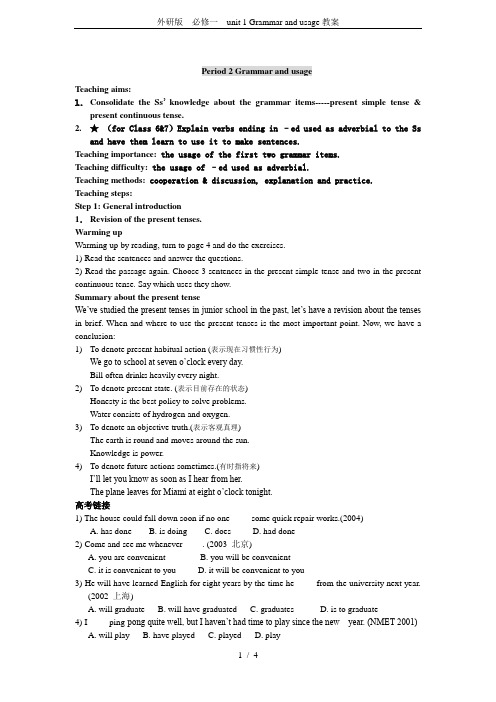
Period 2 Grammar and usageTeaching aims:1.Consolidate the Ss’knowledge about the grammar items-----present simple tense &present continuous tense.2.★(for Class 6&7)Explain verbs ending in –ed used as adverbial to the Ssand have them learn to use it to make sentences.Teaching importance: the usage of the first two grammar items.Teaching difficulty: the usage of –ed used as adverbial.Teaching methods: cooperation & discussion, explanation and practice.Teaching steps:Step 1: General introduction1.Revision of the present tenses.Warming upWarming up by reading, turn to page 4 and do the exercises.1) Read the sentences and answer the questions.2) Read the passage again. Choose 3 sentences in the present simple tense and two in the present continuous tense. Say which uses they show.Summary about the present tenseWe’ve studied the present tenses in junior school in the past, let’s have a revision about the tenses in brief. When and where to use the present tenses is the most important point. Now, we have a conclusion:1)To denote present habitual action (表示现在习惯性行为)We go to school at seven o’clock every day.Bill often drinks heavily every night.2)To denote present state. (表示目前存在的状态)Honesty is the best policy to solve problems.Water consists of hydrogen and oxygen.3)To denote an objective truth.(表示客观真理)The earth is round and moves around the sun.Knowledge is power.4)To denote future actions sometimes.(有时指将来)I’ll let you know as soon as I hear from her.The plane leaves for Miami at eight o’clock tonight.高考链接1) The house could fall down soon if no one ____ some quick repair works.(2004)A. has doneB. is doingC. doesD. had done2) Come and see me whenever ____. (2003 北京)A. you are convenientB. you will be convenientC. it is convenient to youD. it will be convenient to you3) He will have learned English for eight years by the time he ____ from the university next year.(2002 上海)A. will graduateB. will have graduatedC. graduatesD. is to graduate4) I ____ ping-pong quite well, but I haven’t had time to play since the new year. (NMET 2001)A. will playB. have playedC. playedD. play5) --You are drinking too much.--Only at home. No one ____ me but you. (2000 北京)Warming up1) Warming up by reading My First Day at Senior High again and underline the adjectives with–ing or –ed endings.2) Warming up by choosingA. The –ing form describes characteristics of thingsB. The –ed form describes the characteristics of peopleC. The –ing form describes the people or things that cause the feelingYou may see the –ing or –ed forms of verbs from time to time in our reading materials used as adjectives as predicative to express the characteristics of something or somebody, but do youTheir regulation in usage can be shown in following patterns:sb. + be + -ed (the –ed form describes people)sth. + be + -ing(the –ing form describes things)高考链接I used to play ping-pong a lot in my spare time, but now I’m interesting in football. (1997Step2: Exercises for consolidation1. Exercises for the present tense1. I ____ to have another try if I can get another chance.A. have been meaningB. meanC. am meaningD. meant2. ____ your broken leg.A. Do be careful ofB. Do care forC. Be carefulD. To be care full to3. It’s the third time that you ____ late for school this week.A. wereB. areC. had beenD. have been4. I won’t go home until I ____ the job.A. have doneB. had doneC. have beenD. are5. These kinds of shoes ____ well.A. don’t sellB. are not sellC. won’t be soldD. were not sold6. A quarrel ____ between the two neighbors.A. broke outB. was broken outC. is breaking outD. is broken out7. How long do you think the meeting ____ ?A. lastsB. will lastC. is lastedD. is lasting8. Our school yard ___ an area of 1,500 square meters.A. coversB. is coveredC. extendsD. is extended9. While this tough meat is being cooked, more water should ____ it.A. add toB. be added toC. had been added up toD. will be added to10. They left for Beijing last week and we ____ them so far.A. don’t hear fromB. didn’t hear fromC. haven’t heard fromD. won’t hear from11. You are very busy. I ____ you ____ hard for your experiment.A. suppose, are workingB. am supposing, are workingC. am supposing, workD. suppose, work12. My brother ____ a lot. He ____ a new novel at the moment.A. reads, readsB. reads, is readingC. is reading, is readingD. is reading, read13. Perhaps it will be a long time ____ from abroad.A. when Tom comes backB. when Tom will come backC. before Tome comes backD. that Tom comes back14. There ____ the bus. Harry up.A. is comingB. comeC. comesD. had come15. If you ____ over there for a moment, the manager will be here soon.2. Exercises for the participlesTranslate the following into English by using the–ing or –ed forms of verbs. They are used not only as predictive but also as complements of object, but the regulation is similar.1)你讲的这个事情很有意思。
Unit 1 Grammar and usage 1 课件-高中译林版必修1精品
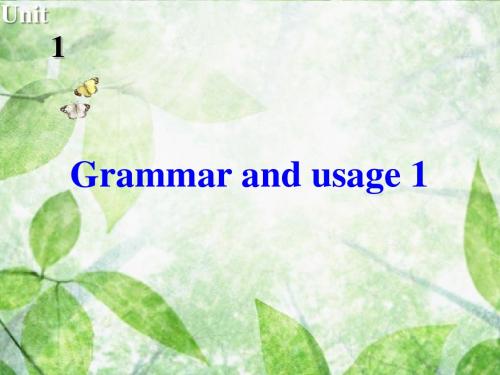
3) Mary is a student who is 21 years old.
Main clause & the attributive clause
• Mary is a student who is 21 years old. ( 主句部分 ) ( 从句部分 ) • He who laughs last laughs best. ( 从句部分 )
Unit
1
Grammar and usage 1
课件描述:
该课件讲解定语从句的基本结 构、概念和关系代词的功能。让学生 能识别定语从句。
What’s the function of the underlined part?
1)Mary is a 21-year-old student. She is a nice girl. 2) Mary is a student 21 years old. Mary is a student in her twentind the attributive clauses in the article in page 9.
Consolidation
• Workbook P88. Ex. C1
Homework
zxxk
• 1. Find the sentences with attributive clauses in the reading passage on P2-3. • 2. Preview the material on P10-11.
Function of relative words in the attributive clauses.
David is a kind person. He always helps others.
Book 1M1 U2 Grammar and usage 1牛津高中英语模块一第二单元语法1
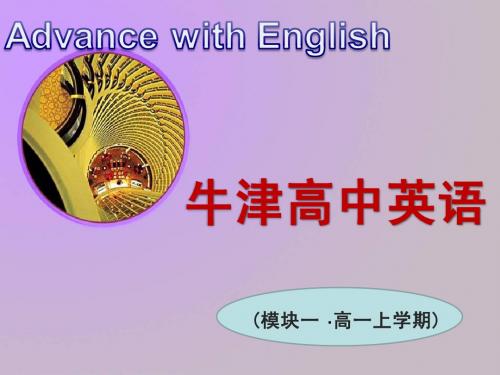
Fill in the blanks with “prep.+ which/whom”: to _____ 1. Are you interested in any songs ____which you’ve listened. on _____ 2. Tomorrow is a particular day ____ which his daughter will get married. 3. This is the knife with _____ I usually cut ____ which bread. 4. We can’t live without the sun from _____ we ____ which get heat and light. 5. The subject ____which Eric is interested is in _____ physics.
Conclusion: Relative pronoun “whose” can be replaced with “of which”, but you must pay attention to its form.
5. 你用那种方式来对待你的父亲,我不喜欢 那种方式。 You treat your father in the way. I don’t like that way.
4. 我没有参加那次会议,当时我没有认识到 那个会议的重要性。 I didn’t attend the meeting. I didn’t realize its importance at that time. I didn’t attend the meeting whose importance I didn’t realize at that time. the I didn’t attend the meeting the importance of which I didn’t realize at that time.
江苏省徐州市译林牛津版高中英语必修一Unit1 Grammar and usageGrammar 教案1
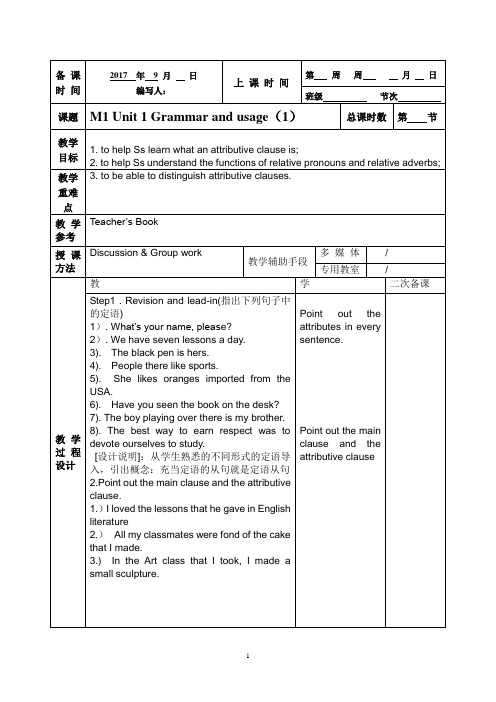
3.总结定语从句中的关系词
1指代先行词;
②位于从句句首,连接定语从句与主句;
③并在定语从句中充当从句某一成分。
[设计说明]:在高一学生学习定语从句的时候,有必要把主句和从句、先行词和定语从句、关系词等基本概念理清。
Step3.Practice—Distinguishing attributive clauses
Point out the main clause and the attributive clause
教学过程设计
教
学
二次备课
Step2. Introduction to attributive clauses
1. Introduce the terms of ‘attributive clause’ and ‘antecedent’.
[设计说明]:从学生熟悉的不同形式的定语导入,引出概念:充当定语的从句就是定语从句
2.Point out the main clause and the attributive clause.
1.)I loved the lessons that he gave in English literature
教学重难点
3. to be able to distinguish attributive clauses.
教学参考
Teacher’s Book
授课方法
Discussion & Group work
教学辅助手段
多媒体
/
专用教室
/
教学过程设计
教
学
二次备课
Step1 . Revபைடு நூலகம்sion and lead-in(指出下列句子中的定语)
Unit 1 Grammar and usage 课件高中英语牛津译林版(2020)必修第一册

•What is a goal?
•What’s the significance of setting goals?
•What’s the structure of Miss Yan’s speech?
• Subject:
• a noun, noun phrase or pronoun representing the person or thing that
• He speaks English very well. • I come here to see you. • The boy was praised for his bravery. • When she was 12 years old, she began to live in Dalian. • It rained heavily, causing severe flooding in that country.
• It can either be in front of or behind the noun.
• The boy in blue is Tom. • The number of boy students is 24. • The boy there needs a pen. • Can I have something to drink? • The smiling boy needs a pen bought by his mother. • Please pass me the book which the teacher gave you yesterday.
• [Adverbial]:
• Adverbials are generally played by adverbs, prepositional phrases, participles and participle phrases. Its position is generally placed at the end of a sentence, but it can also be placed at the beginning or in a sentence.
高中英语选择性必修第一册 Unit1Grammar and usage 教案
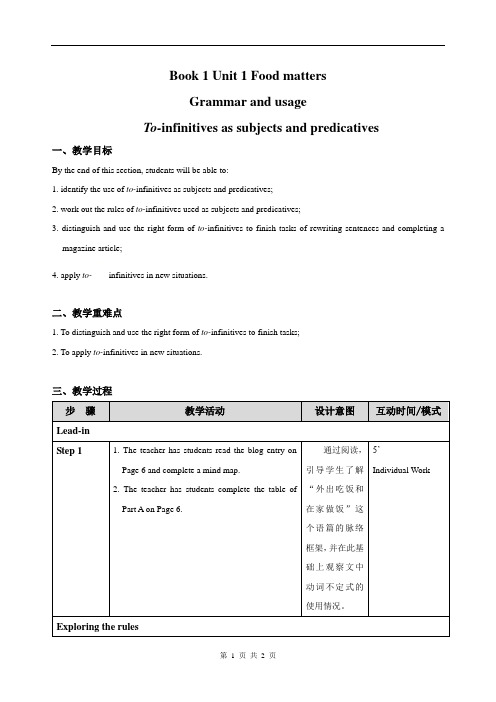
Book 1 Unit 1 Food mattersGrammar and usageTo-infinitives as subjects and predicatives一、教学目标By the end of this section, students will be able to:1. identify the use of to-infinitives as subjects and predicatives;2. work out the rules of to-infinitives used as subjects and predicatives;3. distinguish and use the right form of to-infinitives to finish tasks of rewriting sentences and completing amagazine article;4. apply to-infinitives in new situations.二、教学重难点1. To distinguish and use the right form of to-infinitives to finish tasks;2. To apply to-infinitives in new situations.三、教学过程步骤教学活动设计意图互动时间/模式Lead-inStep 1 1. The teacher has students read the blog entry onPage 6 and complete a mind map.2. The teacher has students complete the table ofPart A on Page 6.通过阅读,引导学生了解“外出吃饭和在家做饭”这个语篇的脉络框架,并在此基础上观察文中动词不定式的使用情况。
译林版高中英语必修一Unit1 Grammar and usage (I) 教案(雅礼)
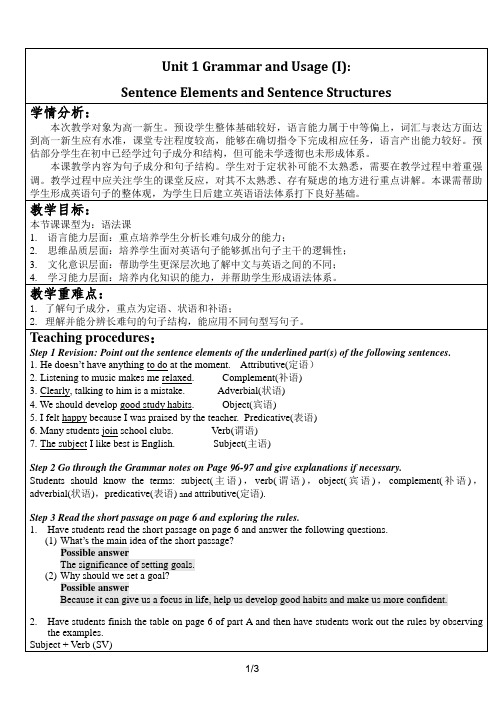
3.Clearly, talking to him is a mistake.Adverbial(状语)
4. We should developgood study habits.Object(宾语)
ask, bring, buy, cost, give, hand, lend, pass, pay, read, return, sell, send, show, take, teach, tell, write…
(2)Make sentences using S+V+IO+DO structure.
Practice
Complete the following sentences with proper object complements.
1. She felt somethingclimbingon her skin.
2. Justine named his grandsonMax.
3. My classmates painted the back wallwhite.
本课教学内容为句子成分和句子结构。学生对于定状补可能不太熟悉,需要在教学过程中着重强调。教学过程中应关注学生的课堂反应,对其不太熟悉、存有疑虑的地方进行重点讲解。本课需帮助学生形成英语句子的整体观,为学生日后建立英语语法体系打下良好基础。
教学目标:
本节课课型为:语法课
1.语言能力层面:重点培养学生分析长难句成分的能力;
3.Find thesubjectsandthe verbsof the following sentences.
(1)Youwill discoveryour potential while you develop as a student and as a person.
高一英语B1U1_Grammar and usage

Applying the rules
(1) The tips below may help you. (2) They will seem easier to reach. (3) This will also give you the encouragement
to achieve your long-term goal. (4) You can keep the list on your bedside table. (5) You may find achieving goals difficult. (6) You should not give up. (7) You will succeed in the end.
refers to a person and the direct object a thing. 4. The object complement adds more information about the object.
Applying the rules
1. You will find(~se~n~io~r ~hi~g~h)~sc~h~oo~l d~i~ff~er~e~n~t ~fr~o~m~(j~u~n~io~r~h~ig~h~)s~c~h~oo~l~.
a SV b SVP c SVO d SVOO e SVOC f SVA g SVOA
Applying the rules
• We found the hall full. • We found the great hall full of students and teachers. • We found the great hall full of students and teachers listening
高一英语Unit1 Grammer and Usage 上学期 译林牛津必修1
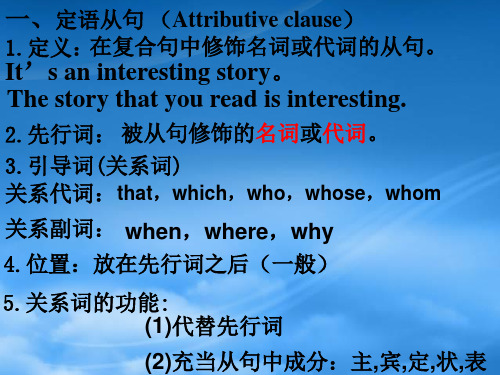
who
which
who
who
who
to whom
who
which
/that
/that
( )
/that
/whom
( )
/that
/whom
( )
/that
关 系 代 词
9. Is there anything else _______ you want to say? 10.Any person _______ has the money can join the group. 11.He often speaks the role he played in the play, _______ made others upset. 12.He opened the door, in front of _______ sat a boy. 13.The man to _______ I spoke is a famous scientist. 14.The boy _______ mother is dead was brought up by his father.
who
whom
whose + n.
whose + n.
介 + which
介 + whom
the + n. + of + which
of + which + the +
of + whom + the + n.
that
×
Let me check your homework.
物
人
主
宾
定
Unit1-Grammar-and-usage
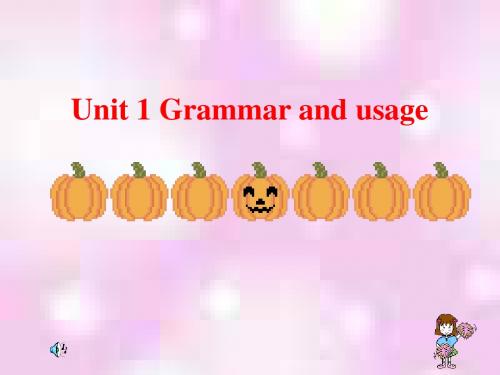
Judge the following sentences “T” or “F”: ( F ) 1. He has bought the new watch since last Sunday. He has had the new watch since last Sunday. ( T ) 2. Kate has been in Beijing for two days. ( F ) 3. Mr. Brown has left his hometown for ten years. Mr. Brown has been away from his hometown for ten years. ( F ) 4. I have borrowed the book for two weeks. I have kept the book for two weeks. ( F ) 5.His brother has joined the League since three years ago. His brother has been in the League since three years ago. His brother has been a League member since three years ago.
2. I have kept the book for two weeks. I borrowed the book two weeks ago. It’s (has been) two weeks since I borrowed the new watch. 3. This factory has been open since ten years ago. This factory opened ten years ago. It’s (has been) ten years since this factory opened. 4. My brother has been away from school for five years. My brother left school five years ago. It’s (has been) five years since my brother left school.
译林版英语必修一Unit 1 Grammar and usage(Attributive Claus

比较:翻译My brother who is 18 years old is a college student.My brother, who is 18 years old, is a college student.Step 4. Consolidation1.He has lost the key to the drawer _____ the papers are kept.A. whereB. on whichC. under whichD. which2. The Second World War _____ millions of people were killed ended in 1945.A. whenB. during thatC. in whichD. which3.He was born in the year _____ the Anti-Japanese War broke out.A. whichB. whenC. on whichD. during which4. He has two sons,_____ work as chemists.A. two of whomB. both of whomC. both of whichD. all of whom5. The buses,_____ were already full, surrounded by an angry crowd.A. most of thatB. which mostC. most of whichD. that most6. He is a man of great experience,_____ much can be learned.A. whoB. thatC. from whichD. from whom7. I gave him a warning,_____ he turned a deaf ear.A. of whichB. for whichC. to thatD. to which8. You may call on me from one to five o’clock, during _____ I am always at home.A. the timeB. what timeC. that timeD. which time9.I have two grammars, ______are of great use.A. all of whichB. either of whichC. both of thatD. both of which10. Last summer we visited the West Lake, ______Hangzhou is famous in the world.A. for whichB. for thatC. in whichD. what11. The people, ________ had been damaged by the flood, were given help by the Red Cross.A. all whose homesB. all of whose homesC. all their homesD. all of their homes12. This machine, ______for many years, is still working perfectly.A. after which I have lookedB. which I have looked afterC. that I have looked afterD. I have looked after13. This is the magazine _______ I copied the paragraph.A. thatB. whichC. from thatD. from which14. — Why does she always ask you for help?— There is no one else _______ , is there?。
译林版英语必修一U1 Grammar and usage and Integrate重点词汇讲练课件
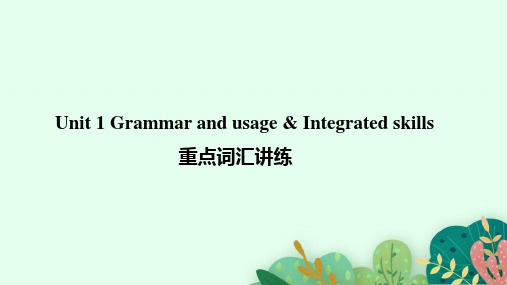
as
a
result of the disaster.
4.base vt.以……为基础(依据) n.根据;基础;基底;总部,大本营 【教材原句】Instead,you should set goals based on your abilities and skills. 相反,你应该根据自己的能力和技能来设定目标。 【归纳拓展】 (1)base...on...把……建立在……的基础上 be based on/upon以……为基础 base...in...把……安置在…… (2)basic adj.基础的 basically adv.基本地,基本上
by mid-July.(aim to do sth) by mid-July.(aim at doing sth)
by mid-July.
重点句式
动名词(短语)作主语 【教材原句】Finally,setting goals makes you more confident. 最后,设定目标会让你更自信。
【归纳拓展】 (1)动名词(短语)作主语时,常常放在句首;当表语为no use,no good,any good 等词或useless,nice,good,interesting等形容词时,句首常用it作形式主语,而将 动词-ing形式后置。 (2)两个或两个以上的动名词作主语时,谓语动词要用复数。 (3)除了动名词可作主语外,动词不定式也可作主语,但动词不定式作主语 时多表示一次性的、具体的动作。 (4)动名词(短语)作主语时,如果要突出动作的执行者,在动名词(短语)前加 上其逻辑主语,其逻辑主语要用名词所有格或形容词性物主代词,不能用名 词的普通格或人称代词宾格。
shouldn’t
be
built near the school.
- 1、下载文档前请自行甄别文档内容的完整性,平台不提供额外的编辑、内容补充、找答案等附加服务。
- 2、"仅部分预览"的文档,不可在线预览部分如存在完整性等问题,可反馈申请退款(可完整预览的文档不适用该条件!)。
- 3、如文档侵犯您的权益,请联系客服反馈,我们会尽快为您处理(人工客服工作时间:9:00-18:30)。
Function of relative words in the attributive clauses.
David is a kind person. He always helps others.
David is a kind person who always helps others
subject
The lady step with the lady.
The lady (whom) he was dancing with stepped on his foot. Do you know the man? You will visit him today. Do you know the man whom you will visit today?
牛津高中英语
(模块一 · 高一上学期)
Unit
1
Grammar and usage 1
板块:教学设计—课件
课件描述:
该课件讲解定语从句的基本结 构、概念和关系代词的功能。让学生 能识别定语从句。
What’s the function of the underlined part?
1)Mary is a 21-year-old student. She is a nice girl. 2) Mary is a student 21 years old. Mary is a student in her twenties.
• I sat next to a girl. • Her name was Diane. • I sat next to a girl whose name was Diane. • He lives in the house. • The windows of the house face south. • He lives in the house whose windows face south. • I met him in the street. • His glasses were very beautiful. • I met him whose glasses were very beautiful in the street.
Do you find the pen? I wrote with it just now. Do you find the pen (which) I wrote with just now?
Mrs. Clark is angry with the goat. The goat is eating her flowers. Mrs. Clark is angry with the goat which is eating her flowers. Can you lend me the book? You talked about it last night. Can you lend me the book (which) you talked about last night.
The boy is Tom. He sits in front of me.
The boy who sits in front of me is Tom.
The woman got the job.
The woman can speak Russian. The woman who can speak Russian got the job.
attributive clause定语从句: 修饰主句中名词或代词的从句叫做定语从句。 antecedent 先行词: 被定语从句所修饰的名词或代词叫做先行词。 relative pronoun & relative adverb: 引导定语从句的代词或副词叫做关系代/副词。 关系代词有:which; that; who; whom;whose 关系副词有: where; why; when Mary is a student who is 21 years old. ( 先行词 ) ( 关系代词) The school where he studied is in Shenzhen. ( 先行词) ( 关系副词 )
3) Mary is a student who is 21 years old.
Main clause & the attributive clause
• Mary is a student who is 21 years old. ( 主句部分 ) ( 从句部分 ) • He who laughs last laughs best. ( 从句部分 )
The teacher will give us a talk.
The teacher is famous. The teacher who is famous will give us a talk.
The boy is in the lab.
You want to talk to him. The boy (whom) you want to talk to is in the lab. This is the boy. I sit behind him. This is the boy (whom) I sit behind.
attribute
The boy is Tom. The boy is smiling.
The boy who is smiling is Tom.
(主语)
The boy is Tom. The boy has a round face.
The boy who has a round face is Tom.
I like the gift. He got the gift for me.
I like the gift which he got for me.
object
He is a great boy. His name will be remembered.
He is a great boy whose name will be remembered.
